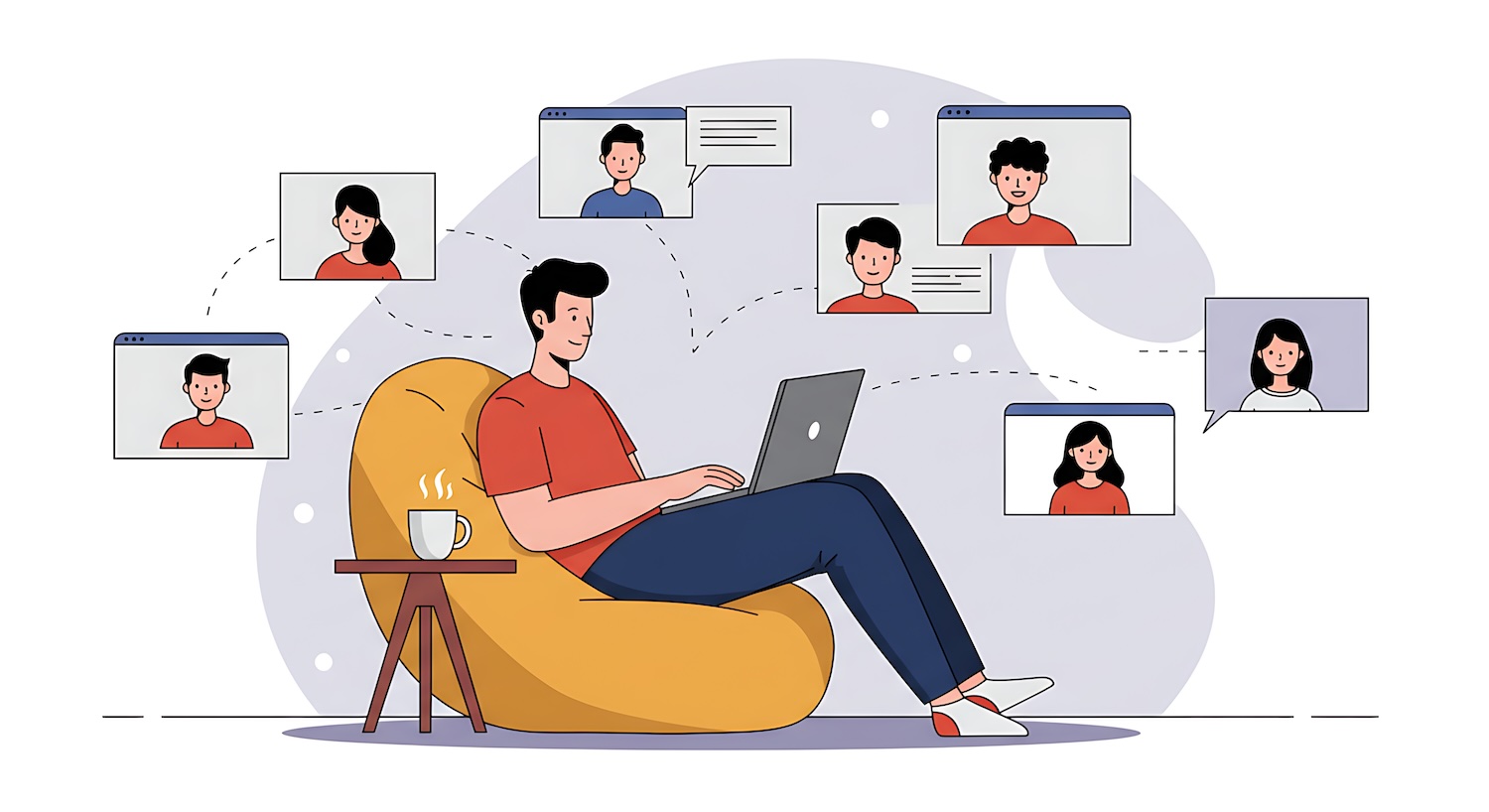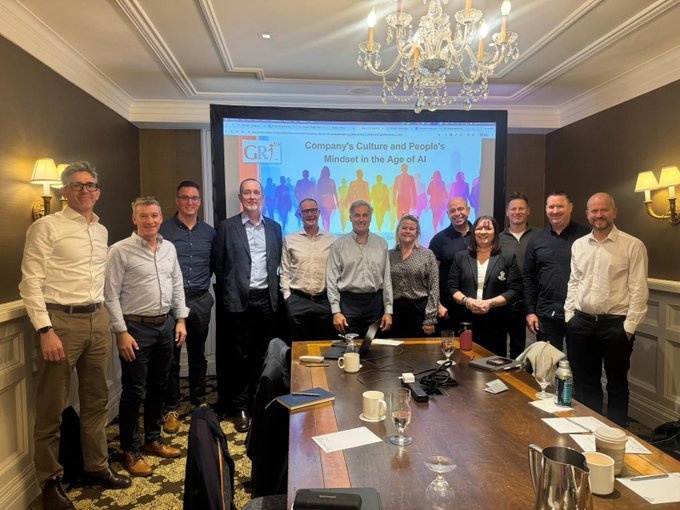Hybrid Work: A Management Revolution
Posted by Frederic Lucas-Conwell

Hybrid Work: A Management Revolution
The COVID-19 pandemic has acted as an unprecedented catalyst, radically transforming our approach to work. What was once a marginal practice has become the norm for many companies: remote work and then the hybrid model. This transition, far from being a mere temporary adjustment, has emerged as a lasting paradigm shift, redefining employee expectations and managerial practices. Gérard Arnaud, a recognized expert in management development, has experienced this transformation firsthand, offering valuable insights into the challenges and opportunities it has created. This in-depth interview explores his experience, the evolution of “Work From Anywhere” (WFA) since 2020, and the profound implications for management, collaboration, and corporate culture today.
In this discussion between Frederic Lucas-Conwell and Gérard Arnaud, we explore how the crisis has forced a reevaluation of working methods and highlighted the critical importance of accurate communication and authentic relationships in an increasingly decentralized professional world. Frederic is the founder of the San Francisco-based Growth Resources Institute (GRI), which specializes in performance measurement and its applications in organization and leadership development. Gérard has been a consulting partner in France since 2016.
The First Steps in Remote Work: The Founding Experience
Gérard's adventure with remote working began unexpectedly in July 2020. Just as the first lockdown had just ended, a company in the tourism industry approached him, as its management committee felt helpless when faced with the challenges of post-lockdown remote working, and after their industry had been significantly impacted by the pandemic.
Gérard quickly identified the need for a personalized approach with the GRI, which was central to his intervention, helping to understand how different people within the team had experienced the lockdown and, by extension, remote management. GRI’s approach deploys by training managers and transferring skills based on accurate behavioral measures, but in this case, a consulting intervention seemed the most appropriate to kick-start the relationship.
“I had everyone take the GRI. I still did individual debriefs, which I always do, and then we did a group debrief,” explains Gérard. This approach revealed clear behavioral and emotional patterns. Gérard was able to convincingly demonstrate that nearly 90% of what employees liked or disliked during this period was directly linked to their adaptive profile and intrinsic preferences. This intervention, which lasted three hours for a team of ten managers, not only offered individual insights; it also opened the discussion on how to collaborate effectively remotely, taking into account the specificities and needs of each team member. It was a fundamental lesson: remote management is not one size fits all; it requires adaptation and a deep understanding of the individual.
Remote Communication: The Imperative of Managerial Precision
Gérard's experience with this executive team highlights a crucial aspect of remote working: the critical importance of choosing communication tools and the need for unparalleled managerial precision. Gérard quickly observed that certain tools were inherently better suited to certain profiles of people and certain types of exchanges. For example, an email, which offers the opportunity to take the time to reflect and structure one's thoughts, is often better suited to an "analytical and formal" personality than a Slack or WhatsApp conversation, where responses are rapid-fire and exchanges are more instantaneous and sometimes chaotic.
"It's not them who aren't playing the game, but you're using the wrong communication tool," he says with conviction. This awareness was a key element in helping the teams better understand how each member experienced the situation and interacted. It helped prevent hasty judgments and promote better mutual understanding.
But beyond the choice of tool, remote working requires increased precision from managers. Gérard emphasizes that we can no longer afford the same approximations or informal "catch-ups" as in person. "When you're in close proximity, you're not precise. The next day, the person you see, you say yes, in fact it's no, but maybe, or they come to ask you the question naturally, you correct it, you pass them in the corridors and say to yourself: by the way, what you told me the other day, I didn't really understand that. Now you no longer pass that person in the hallway. So, every time you speak, you have to be fairer, clearer in your vision, develop belonging, etc." This requirement for clarity and precision in every interaction becomes the cornerstone of effective remote management, where every word counts and every message must be deliberate.
Remote working: Now an Established Standard
Five years after the first experiences of enforced confinement, remote working and hybrid working are no longer exceptions, but a firmly established norm in the professional landscape. The questions are no longer "if it's possible," but rather "how best to do it" and, crucially, "how can managers be confident in how management will be carried out?" This evolution marks a maturity of the model, but also a growing complexity of expectations.
Gérard observes that this generalization has highlighted the shortcomings of "bad managers" who, in person, could often "make up for it" thanks to physical proximity and spontaneous interactions. Remotely, this ability to quickly correct is largely lost, requiring greater preparation and intentionality. "You have to be good in the meeting. You have to make an impact because the next time you meet with the other person will be in a week. You have to be strong during your meeting because that's when you're going to impact the other person." The remote manager must become a more impactful communicator and leader, with each interaction being an opportunity to strengthen clarity and commitment.
Furthermore, the remote policy has become an essential, even disqualifying, criterion for candidates in the job market. "Today, 100% of candidates ask about the company's remote work policy," notes Gérard, emphasizing the strategic importance of this dimension for attracting and retaining talent. Remote work is no longer a perk; it's an expected component of the employer's offering.
Younger Workers: The Quest for Connection and Networking
One of the most pressing issues raised by the rise of remote and hybrid work concerns younger generations and their ability to build meaningful relationships and a strong professional network. For many, the years of study during lockdown were synonymous with isolation, depriving them of an essential part of the student experience: social interactions, chance encounters, and building a circle of friends and future colleagues.
"What young people appreciate about hybrid mode is the time they spend at work meeting other people," explains Frederic. This observation highlights a fundamental need: that of human interaction. If hybrid work is limited to sitting alone in front of a computer at the office, it loses much of its appeal and meaning for this generation. Gérard reinforces this idea by mentioning a young person he knows who couldn’t stand studying during the lockdown because, for them, studying was about friends; it was a place.
The transition from school to the workplace is a crucial stage, where developing social skills and networking are as important as acquiring technical knowledge. A well-designed hybrid model can provide a balance, allowing for both the flexibility of remote work and opportunities for in-person interaction. Companies, therefore, have a responsibility to create environments that foster these connections, transforming offices into places for collaboration, learning, and socializing, rather than simply individual workspaces.
Remote Management Reinvented: Anticipate, Plan the Informal, and Clarify Objectives
Remote management, far from being a simple transposition of traditional practices, requires a complete reinvention of methods and mindsets. Gérard emphasizes the need for increased anticipation and planning, qualities that were less in demand in an exclusively face-to-face work environment. He cites the telling example of a CEO who suddenly realized he no longer saw his assistant the same way he used to. In person, informal and spontaneous interactions were commonplace, even without formal meetings. Remotely, this connection weakens if no proactive action is taken.
"Remote management requires more anticipation," insists Gérard. This anticipation isn't limited to formal tasks; it extends to the informal sphere. Gérard goes even further, suggesting "planning the informal." Deliberately creating moments of spontaneous discussion, such as discussing football via WhatsApp or a quick call to check in, is essential for maintaining team cohesion, a sense of belonging, and employee well-being. They replace spontaneous conversations in the hallway or at the coffee machine, which cement relationships in person.
Additionally, hybrid work requires managers to be crystal clear in their expectations and provide more structured guidance to their teams. "I think this hybrid work environment also forces managers to be clearer about what they're asking of their employees, to provide better guidance, to be clearer about what's required, and to give them the means to work autonomously without being available every minute if a question arises," adds Frederic. This demand for clarity applies at all levels: objectives, processes, expectations, and feedback. Managers must provide robust frameworks that allow for autonomy while ensuring alignment and productivity.
Authentic Relationship Are a Valuable Lesson in Family Bonds
One of the most profound lessons learned from this interview lies in the powerful parallels drawn between managing remote teams and family relationships. Gérard and Frederic agree that a deep understanding of others is absolutely fundamental to building authentic relationships, whether they're with one's children, spouse, or colleagues. "The only analogy I found that was correct was the one used in relationships within a couple, in relationships within a family, saying: you see how long it takes you to understand your children and your spouse. Look at your colleagues, a bit as if they were members of your family," suggests Frederic. This perspective invites managerial humility, recognizing that understanding others is an ongoing, often complex process.
Gérard shares his eloquent personal experience: "I also managed, but not managed, rather raised my children remotely because I was divorced and had to create another relationship with my two eldest children." He emphasizes that, as with children, you can't afford to make mistakes or get upset remotely. Every interaction is precious and must be conducted with precision and intention. "You must have a fairer relationship."
This awareness of being "fairer" and developing an "authentic relationship" is not just an aspiration; it is an operational necessity. The GRI, according to Gérard, is "fundamental to the success" of this approach, because it allows us to better understand how others operate and adapt our communication accordingly. Ultimately, the success of hybrid work depends on managers' ability to invest in the quality of human relationships, cultivate empathy, and recognize the value of each individual, even remotely.
Managers Are the Key to Success for a Hybrid Work Model
Ultimately, the discussion with Gérard constantly brings us back to the central role and increased responsibility of managers in the era of hybrid work. The success of this new model depends not only on technological tools or company policies, but fundamentally on the ability of leaders to adapt, to be more precise in their communication, to anticipate the needs of their teams, and to build authentic relationships.
The evolution of work since the pandemic has not only transformed daily practices but also required a real metamorphosis of managerial skills. Communication, coaching, the ability to inspire autonomy, and understanding personalities are now at the heart of collective success. Managers are no longer mere supervisors, but facilitators, coaches, and relationship builders, whose impact is measured by their ability to navigate a complex and decentralized environment. "Work From Anywhere" isn't just about location; it's about enlightened leadership and strengthened human relationships.
Latest Articles
Groupama Successful Transformation in Romania: The GRI, Catalyst for Profound Change
The history of Groupama in Romania is an eloquent testament to resilience, strategic vision, and the transformative impact of innovative management tools. Arriving at the...
Leadership 3.0: Objective Insights for People-Centric Leaders
Steve, a brilliant entrepreneur, poured his heart into his work. His team at "Innovatech" was on the brink of a major breakthrough, a new app that promised to revolutionize...



